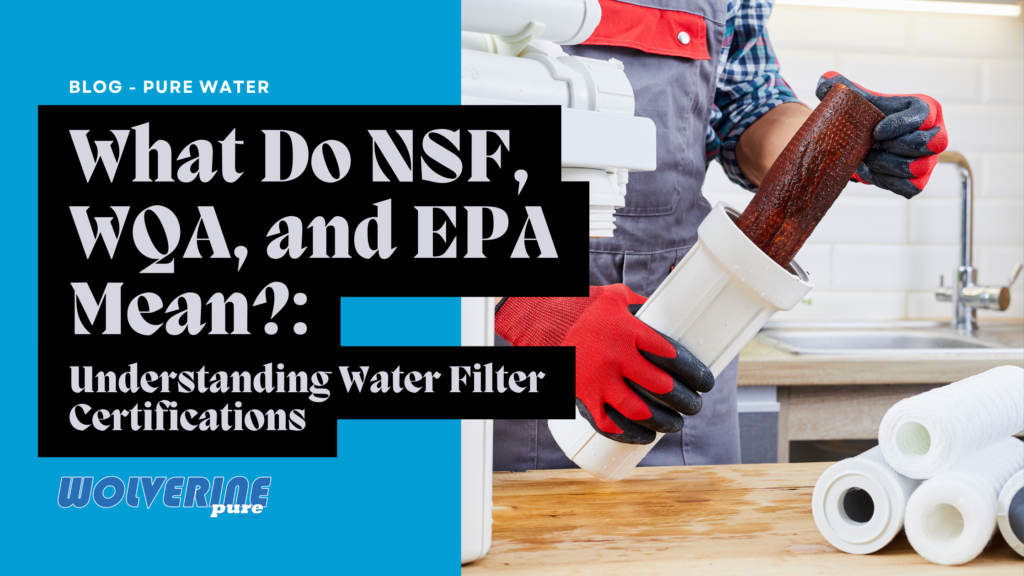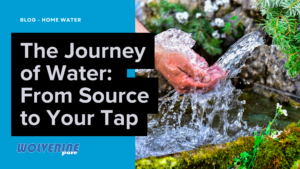When it comes to choosing the right water filtration system, the options can feel overwhelming. One of the most important factors to consider is whether the product has been certified by trusted organizations. Certifications act as a seal of approval, ensuring the product meets specific standards for performance, safety, and quality. But what do labels like NSF, WQA, and EPA actually mean? Let’s break them down to help you make an informed choice.
What Are Water Filter Certifications?
Water filter certifications are endorsements from independent organizations that test filtration products against rigorous criteria. These certifications verify that the filter does what it claims—whether that’s removing contaminants, improving taste, or softening water.
Without these certifications, there’s no guarantee the system is effective or safe to use. So, understanding these labels is key to making a smart investment for your home.
NSF Certification: A Gold Standard in Water Safety
What it stands for: NSF International (formerly the National Sanitation Foundation)
What it means: NSF certifications ensure the water filter meets specific standards for performance, material safety, and contaminant reduction.
There are different NSF certifications, each addressing a unique aspect of filtration:
- NSF/ANSI 42: Focuses on aesthetic improvements like taste, odor, and chlorine reduction.
- NSF/ANSI 53: Verifies the removal of health-related contaminants such as lead, mercury, and volatile organic compounds (VOCs).
- NSF/ANSI 401: Tests for emerging contaminants like pharmaceuticals and pesticides.
If a filter has the NSF mark, you can trust it’s been rigorously tested to deliver safe, clean water.
WQA Certification: Water Quality Association’s Stamp of Approval
What it stands for: Water Quality Association
What it means: The WQA’s Gold Seal Certification indicates that the product has been tested for structural integrity, contaminant reduction, and material safety.
What makes WQA certification stand out is its focus on the durability of the product over time, ensuring the system remains effective long after installation. This certification is particularly valuable for families looking for long-term performance and reliability.
EPA Standards: Protecting Public Health
What it stands for: Environmental Protection Agency
What it means: While the EPA doesn’t issue certifications for home water filters, it sets the legal limits for contaminants in drinking water through the Safe Drinking Water Act.
Filters that meet EPA standards comply with the agency’s guidelines for removing harmful substances like lead, arsenic, and bacteria. This is a baseline standard often referenced in other certifications, ensuring filters align with public health benchmarks.
How to Use Certifications When Shopping for a Water Filter
Now that you understand what these certifications mean, here’s how to apply this knowledge when selecting a water filtration system:
- Check the Label: Look for NSF, WQA, or EPA compliance directly on the product or packaging.
- Match Your Needs: If your water has specific issues (e.g., high chlorine levels or lead contamination), check that the filter’s certifications address those concerns.
- Research the Product: Visit the certifying body’s website to verify the certification is current and legitimate.
- Ask Questions: Reputable manufacturers should be transparent about their certifications and the testing process.
Why Wolverine Water Systems Prioritizes Certified Solutions
At Wolverine Water Systems, we know that trust and transparency are critical when it comes to something as essential as your home’s water. That’s why our products meet or exceed industry standards, earning certifications from trusted organizations.
When you choose Wolverine, you’re not just getting cleaner water—you’re getting peace of mind.
The Bottom Line
Water filter certifications like NSF, WQA, and EPA give you confidence that your filtration system will deliver on its promises. By understanding these labels and how they work, you can choose a system that protects your family’s health and enhances your home’s water quality.
Ready to take the next step? Contact Wolverine Water Systems today to learn more about our certified filtration and softening solutions.
Need help finding the perfect water system for your home? Let’s get started—your cleaner, safer water awaits!





